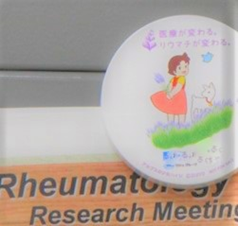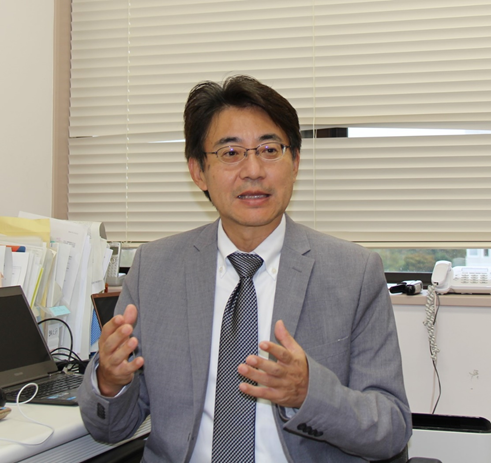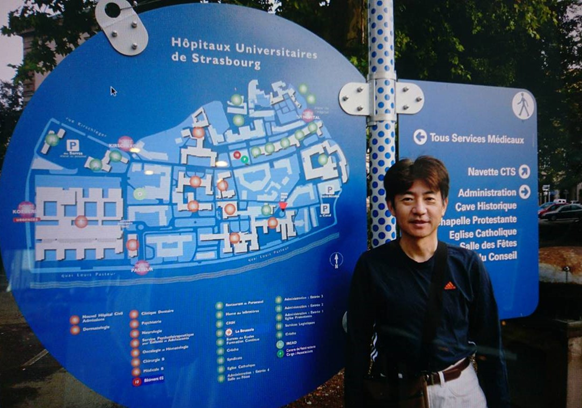TSUKUBA FUTURE
#099 Searching for the Switch that Controls Autoimmunity
Associate Professor MATSUMOTO Isao, Faculty of Medicine

Autoimmune disorders, a well-known example of which is rheumatoid arthritis, are a group of diseases that cause chronic inflammation or functional impairment in various organs, the joints, or the skin. They are known to develop due to abnormal functioning of the immune system, but their precise mechanisms remain unclear. In his work as both a clinician and a researcher, Prof. Matsumoto is searching for hints to developing better methods for diagnosis, treatment, and prevention of these intractable diseases that affect many people but are rarely cured completely.

The immune system is an important system that defends the body against foreign substances such as viruses and bacteria in order to protect it from disease. However, it frequently behaves in problematic ways as well. Hay fever and other allergies result from the immune system overreacting to foreign substances, and various autoimmune disorders result from the immune system misinterpreting a native substance in the body as a foreign substance and attacking it. One group of autoimmune disorders is called connective tissue diseases. The most prevalent of these is rheumatoid arthritis. "Rheuma" comes from a Greek word meaning "flow," and signifies that joint swelling spreads across the body and causes swelling everywhere in this disease. In a sense, it is a strange disease because it has always affected a certain number of people regardless of country, race, or era. It is said that 1 in 100 Japanese people have it, and though it is common in middle-aged women, it affects some young people as well.
Prof. Matsumoto specializes in connective tissue diseases, with a particular focus on treatment of and research on rheumatoid arthritis. As joint pain and swelling persist and worsen in patients with rheumatoid arthritis, the bones deform and inflammation can spread to other organs, which can sometimes cause patients to become bedridden. Because the disease is caused by abnormal functioning of the immune system, it is treated by drugs that suppress the immune system, but these drugs have the negative effect of increasing susceptibility to infectious diseases, though they may not be life-threatening. Rheumatoid arthritis is an intractable disease that is difficult to cure completely, and once it develops it must be continuously controlled with medication.
Understanding the mechanism of onset is the key to treating and preventing disease. However, patients who come to the hospital already have a disease, and it is not clear what happened up to that point. For this reason, Prof. Matsumoto conducted a study in mice to find the origin of autoimmune disorders by searching for where antigens, the source of the body's immunity, are produced and amplified. The University of Tsukuba is developing special model mice in which arthritis is easily triggered. These model mice exhibit the most severe symptoms of arthritis at about the second week after onset, and gradually recover over a period of about a month, which allows researchers to observe mice before and after onset as well as the course after recovery.
This revealed something unexpected. When the mice develop arthritis, cit-ITIH4, a substance produced by citrullination of a specific amino acid in a protein called ITIH4 specifically appeared in the blood. cit-ITIH4 is also found in inflamed joints, and its concentration decreased as the mice recovered from arthritis. Anticitrullinated protein antibodies (ACPA) are known to exist in the blood of patients with rheumatoid arthritis, and detection of these is considered important in diagnosis. However, some patients appear to have a type of rheumatoid arthritis that causes clear symptoms even though ACPA is not detected, and these patients often cannot receive appropriate treatment due to lack of a diagnosis. The cit-ITIH4 antigen that Prof. Matsumoto and his team discovered had received little attention before, but actually serves as a useful biomarker for evaluation of disease severity, because it is detected even in patients who test negative for ACPA and its level fluctuates with the severity of inflammation. Prof. Matsumoto is currently conducting additional research to get clinical feedback on this new biomarker.
As a student, Prof. Matsumoto excelled at physics and math. However, he also enjoys interacting with people, and decided he would rather be a clinician than an academic diving deep into research by himself. He says that he chose connective tissue diseases as his specialty because of his experience caring for patients with severe autoimmune disorders as a medical student and not being able to provide very good treatment. Compared to that time, when there were few effective treatment options other than symptomatic treatment to reduce pain, there are now many excellent drugs available that can prevent disease progression. Even still, clinicians must be strong-willed to treat a disease that is difficult to cure. This means that there are lots of topics to research, which is a source of motivation for Prof. Matsumoto. Though we have entered an age where artificial intelligence (AI) is used to diagnose some diseases, Prof. Matsumoto believes that AI is no match for knowledge and experience cultivated through medical practice and research.
Immunity has always been an important field of medical science. However, many theories once thought to be correct have now been disproven and the textbooks are frequently rewritten, making it a very interesting field. This is why Prof. Matsumoto proactively attends international conferences and other such events in order to stay up to date. Ever since he first decided to become a doctor, Prof. Matsumoto wanted to combine the practice of medicine, where he could work hands-on with individual patients and provide them with better treatments, with medical research, where he could discover new methods for prevention and treatment and save many lives. Now, he is confident that he made the right choice.

Prof. Matsumoto loves sports and served as captain of his college tennis team

In 2011 he revisited Strasbourg University's Hospital where Prof. Matsumoto once stayed.
Article by Science Communicator at the Office of Public Relations



